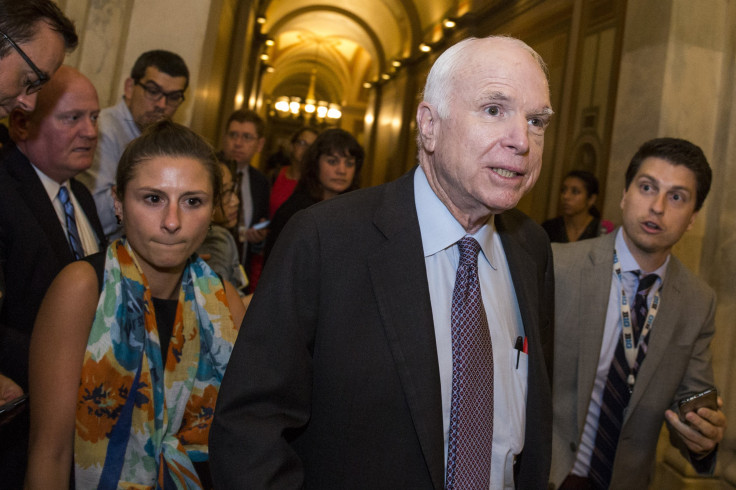Twitter Reacts To Senate Rejecting ‘Skinny’ Obamacare Repeal Bill

In a major setback for the Republican leadership, the Senate on Friday, rejected the new Republican plan to repeal parts of the Affordable Care Act (ACA), also called as Obamacare. The person who shattered the hopes of President Donald Trump by casting the critical vote to dump rejecting Obamacare repeal was Sen. John McCain (R-Arizona).
Trump who usually vents his anger on Twitter, did so even after this vote, writing on the social media platform that three Republicans — referring to McCain, Sen. Susan Collins (R-Maine) and Lisa Murkowski (R-Alaska) — and 48 Democrats disappointed the nation by voting down the so called “skinny repeal” bill 51-49.
With this, seven years of Republican promises to repeal the ACA waned away amid the night drama on Capitol Hill. The Republican majority in Congress were hopeful of repealing the ACA, something which they have been voting against since 2011. Ending Obamacare was one of the pivotal elements of the GOP's pitch to voters last year during the presidential elections. They also persuaded the voters by emphasizing on the fact that if Trump was made the president, and if the Republicans took charge of Congress, Obamacare would definitely be repealed, reports said.
Read: What Is A 'Skinny Repeal'?
Meanwhile, there were a plethora of reactions on Twitter with some mocking the Republicans to move on with their lives since the bill that they are trying to repeal will never be done so, to some praising McCain's decision of casting a vote against it.
The Republicans are nothing more than common thieves. They stole an election, a SCOTUS seat, & now millions of people's health care.
— Matt Murphy (@MattMurph24) July 28, 2017
Do you mean to tell us, that after all your embarrassing RANTING, you've FAILED AGAIN to repeal Obamacare?
— Jules Suzdaltsev 🇺🇦 (@jules_su) July 28, 2017
Well I for one, am shocked!
Obamacare
— Dan Diamond (@ddiamond) July 28, 2017
· Survived by one vote in the Senate in 2010
· Survived by one vote in SCOTUS in 2012
· Survived by one vote in the Senate in 2017
@SenJohnMcCain, facing his own health battle, courageously protects millions of others from losing their access to healthcare.#Obamacare
— Lisa Finlay (@portrushgirl) July 28, 2017
One of the users also posted a video showing people's reactions when they learned Republicans didn't have enough votes to repeal Obamacare.
Senior Editor at Business Insider, Josh Barro tweeted that despite Republicans' efforts, they couldn't get the policy passed.
Friday morning's vote against Obamacare repeal left Trump with no major victory since he assumed office six months ago. Although, the president had promised of dumping Obamacare if he was in office, his lobbying was inconsistent and occasionally counterintuitive. He also criticized, in an interview, the House healthcare bill that passed in May, according to the Guardian.
However, the pertinent question still remains — what next for the healthcare reform? The three main options are — bipartisan committee work, stabilizing the insurance markets and administration action to change the healthcare law, the Hill reported.
One of the options can be that the Senate health committee’s chairman, Sen. Lamar Alexander (R-Tennessee), and top Democrat, Patty Murray (D-Washington), work on the loopholes of the healthcare system in commiittee, the Hill reported citing Sen. John Thune (R-South Dakota).
Some senatars have also pushed for a bipartisan process after being annoyed over the leadership's crafting of the repeal-and-replace bill behind closed doors.
Read: How Did Twitter React To Trump Calling Obamacare ‘17-Year-Old’
Sen. Ron Johnson (R-Wisconsin) and also the the chairman of the Homeland Security and Governmental Affairs Committee said: "I've already talked to my ranking member, and we're already starting to lay out a hearing schedule, just laying out basic problem-solving process."
However, the Republicans will have to come up with a healthcare policy quickly in order to stabilize the markets. Insurers nationwide would also take decisions accordingly of whether they would leave the ObamaCare exchanges or stay in it, reports said.
© Copyright IBTimes 2024. All rights reserved.












